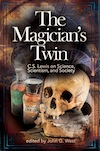 Culture & Ethics
Culture & Ethics
Oxford Ethicist: “Moral Obligation” to Destroy Embryos Carrying Genes for Alcoholism Susceptibility, Other Undesirable Traits
 This is chilling and eerily relevant to Center for Science & Culture associate director John West’s forthcoming book, The Magician’s Twin: C.S. Lewis on Science, Scientism, and Society, coming out September 18 from Discovery Institute Press. Chapter 10 of Magician’s Twin leads off with a discussion of the transhumanist views of Oxford University “ethicist” Julian Savulescu, calling for an improved human race through eugenic selection. Now here is Savulescu in the Telegraph expounding on the theme.
This is chilling and eerily relevant to Center for Science & Culture associate director John West’s forthcoming book, The Magician’s Twin: C.S. Lewis on Science, Scientism, and Society, coming out September 18 from Discovery Institute Press. Chapter 10 of Magician’s Twin leads off with a discussion of the transhumanist views of Oxford University “ethicist” Julian Savulescu, calling for an improved human race through eugenic selection. Now here is Savulescu in the Telegraph expounding on the theme.
Since genes influence behavior — creating, for example, a potential susceptibility to alcoholism — he reasons that it’s simply a matter of “responsible parenting” and a positive “moral obligation” to weed out such undesirable tendencies after conception, thus producing “ethically better children.”
[Savulescu] said that science is increasingly discovering that genes have a significant influence on personality — with certain genetic markers in embryos suggesting future characteristics.
By screening in and screening out certain genes in the embryos, it should be possible to influence how a child turns out.
In the end, he said that “rational design” would help lead to a better, more intelligent and less violent society in the future.
“Surely trying to ensure that your children have the best, or a good enough, opportunity for a great life is responsible parenting?” wrote Prof Savulescu, the Uehiro Professor in practical ethics.
“So where genetic selection aims to bring out a trait that clearly benefits an individual and society, we should allow parents the choice.
“To do otherwise is to consign those who come after us to the ball and chain of our squeamishness and irrationality.
“Indeed, when it comes to screening out personality flaws, such as potential alcoholism, psychopathy and disposition to violence, you could argue that people have a moral obligation to select ethically better children.
“They are, after all, less likely to harm themselves and others.”
“If we have the power to intervene in the nature of our offspring — rather than consigning them to the natural lottery — then we should.”
How would it work in practice?
This involves testing the embryo before it goes into the womb as part of an IVF treatment.
The announcement this summer of the first complete genomic sequencing of a foetus means that within the next five years we may be able to screen for every gene that determines who we are physically and psychologically.
Prof Julian Savulescu believes we now know that most psychological characteristics are significantly determined by certain genes, and it’s quickly becoming possible to test for more and more of these genes in embryos.
Potentially, if couples — such as those going through IVF — wanted to determine several aspects of their child’s personality and talents, they could.
Fancy a child who’s likely to be altruistic? Then look for a version of the COMT gene. Want them to be faithful and enjoy stable relationships? Avoid a variant of AVPR1A.
The message comes down to this: If we have the power to do it, we should. Power, nothing more than power, entails a moral right to use it.
What’s so terrifying about this is the way Savulescu’s advocacy is totally broken free from the universal moral tradition, which Lewis called the Tao. Lewis saw all this coming, more than seventy years ago, and provided a remarkably lucid and compelling framework for understanding the threat of such scientism.
In a 1943 letter to Sir Arthur C. Clarke, referring to Lewis’s scientist-villain Weston in his science fiction novels, Lewis wrote:
I don’t of course think that at any moment many scientists are budding Westons: but I do think (hang it all, I live among scientists!) that a point of view not unlike Weston’s is on the way. Look at Stapledon (Star Gazer [sic] ends in sheer devil worship), Haldane’s Possible Worlds and Waddington’s Science & Ethics. I agree Technology is per se neutral: but a race devoted to the increase of it[s] own forces & technology with complete indifference to ethics does seem to me a cancer in the universe. Certainly if he goes on his present course much further man can not be trusted with knowledge.
The scientists he refers to as his close neighbors, colleagues at Oxford University, occupied the very same offices and walked the same streets that Professor Savulescu does today.
A “cancer in the universe.” Yes, that’s exactly right.
